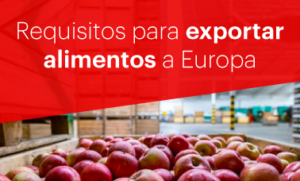Table of Contents

Are you interested in exporting goods outside the EU?
You should know that Spanish exports in the agri-food, fishing, and forestry sectors have been growing exponentially in recent years.
Land Transport of Goods to Europe
The transportation of goods by land to Europe remains crucial. It is one of the key sectors for supplying all kinds of products to certain countries that would not be able to consume them without it. At the European level, it is regulated by European Commission Regulation 107/2009. More information.
But, what products can be exported to Europe?
Most products can be exported; however, you need to consider some restrictions or prohibitions on certain products that may apply in a specific destination country, for which you may need special licenses or authorizations.
How do you determine if your product meets export requirements?
To check this, you should consult the TARIC. Here, you will find information about export restrictions in the European Union Sanctions Map, and in the case of certain products, you may need to contact the competent authorities in the destination country.
Some of the most commonly restricted products include:
- Live animals, meat, and plants
- Endangered species
- Certain food products
- Hazardous chemicals
- Medicines and drugs
- Weapons
- Dual-use goods
- Waste
- Cultural goods (antiques and valuable artworks)
- Counterfeit goods
- Indecent articles, publications, and video recordings
Exports Within the European Union
First and foremost, when exporting a product, it can be done directly to a buyer in their own market, whether it’s another company or a consumer. Alternatively, you can export indirectly through e-commerce platforms to smaller businesses.
Who Can Export Food?
Anyone wishing to export must request a Registration Number from the Economic Operators Customs Administration (EORI). This number will be valid for any export customs declaration within the European Union.
Regarding food exports, it’s possible that the product you want to export requires a special export license or must comply with exceptional restrictions in the destination country. Therefore, you should check this beforehand using the TARIC mentioned earlier or the EU Sanctions Map.
In the food sector, compliance with technical, safety, and health requirements is crucial. Generally, these responsibilities lie with the buyer, who imports these goods.
How and What Requirements Are Necessary for Exporting Food to Europe?

-
- Identify your market.
- Find a buyer for the product you want to export.
- The buyer will need to meet certain requirements and assume responsibility for importing the products into the destination country.
- To identify these buyers, you will need information from various Chambers of Commerce in different markets.
- If it’s your first time exporting, you must assess your product’s position in the domestic market and in other EU countries.
- For food exports, it’s essential to check the restrictions and permits required in the destination country.
Is everything ready now? You must now verify all the documents and permits needed for food exports. These can be divided into three categories:
1. Customs and tax procedures:
- Census declaration
- Registration of intra-community operations
- Intrastat
- Single Customs Document (DUA)
2. Required commercial documents:
- Invoices (proforma and commercial)
- Content list
- Certificate of origin
- ATA and CPD notebooks
3. Goods transport documents:
- In the case of land transport, a CMR is required
What are the technical, health, and safety requirements for your product?
Most products must meet technical, sanitary, and hygienic requirements, which may require various types of certification. These are more common for food and agricultural products, such as:
-
- Plants
- Live animals
- Products of animal origin
- Genetic materials
But how do you certify the product for export?
To do this, consult the Business Assistant and clarify the following four points with the customer/importer of the product:
- Export market certification requirements
- Certificates accepted by competent authorities
- Tests conducted at EU-accredited institutions
- Whether this certification must be carried out in the destination country
In addition, in this sector, the product may require specific packaging and labeling, which may be mandatory or voluntary depending on the country of origin. Voluntary requirements are related to safety, health, and environmental issues. Moreover, the label must always include ingredients, expiration dates, and, in certain cases, batch dates.
Finally, when exporting products within the EU, it’s essential to protect intellectual property, both of the company and the products exported to the importing country. This can be done by checking if new patents, copyrights, or geographic indications for the target market need to be applied for.
Food Export from Spain
After the state of alarm caused by the COVID pandemic, exports from Spain have increased by 2.7% compared to the previous year. This translates to €40,
